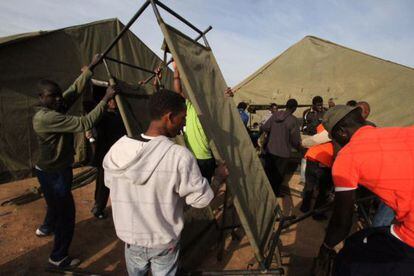Melilla chief: “We cannot go on like this”
Migratory pressure on Spanish exclave is bringing city services to a standstill

The massive border jump by 500 sub-Saharans on Tuesday has placed authorities on renewed alert in the Spanish north African exclave of Melilla.
The Spanish Interior Ministry is sending reinforcements to the area in the form of 100 riot police and 20 Civil Guards whose mission it will be to prevent more undocumented migrants from clearing the fence separating Morocco from Europe’s southernmost point.
But so far, none of the security measures — including the placing of concertina wire atop the fence — have managed to stop growing numbers of migrants from attempting to cross. Tuesday broke a record previously set on October 3, 2005, when 350 sub-Saharans jumped over the Melilla fence in one attempt, at a time when it was much lower and lacked the present security measures.
Migrants have lately been launching coordinated runs on the fences in Melilla and Ceuta, Spain’s other exclave in north Africa. Groups of several hundred people attempt the jump at the same time, divided into small groups. An estimated 1,100 individuals tried it on Tuesday, the Moroccan police reported.
Any day now we’ll find that two thousand people are jumping”
Last year, a total of 1,074 undocumented migrants made it into the city, according to sources at the Interior Ministry. In the two-and-a-half months that have passed since the beginning of 2014, over 1,600 have crossed successfully, representing a spectacular increase.
“We cannot go on like this,” said Melilla leader Juan José Imbroda after Tuesday’s incident, which put the city’s emergency services and temporary immigrant holding center (CETI) under huge pressure. “Important, drastic decisions need to be made. This is a problem for the city and for the central government.”
The army and the Red Cross were sent in on Tuesday to set up makeshift tents and beds to provide food, shelter, medical assistance and rest for the new arrivals, many of whom walked in with cries of “Bosa, bosa” (“Victory, victory”). The CETI is already at four times its holding capacity, providing shelter to 1,900 sub-Saharans.
The government’s delegate in Melilla, Abdelmalik El Barkani, announced that Madrid would “accelerate” the transfer of sub-Saharans to the peninsula, where some will be provided with shelter and others (“where possible”) will be deported in accordance with Spain’s Immigration Law.
Imbroda asked for cross-party unity on the issue to relieve the migratory pressure on the city. “Any day now we’ll find that two or three thousand people are jumping. I’m not sure it's good for us to have to calmly watch as 500 people enter the city, jumping over whoever it takes to do so.”
The Interior Ministry estimates that around 40,000 migrants are waiting in Morocco for their chance to reach Europe. Spain has asked the European Union for financial assistance to police the border.










































